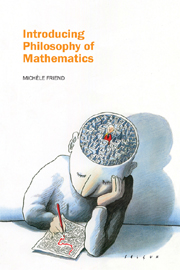1 - Infinity
Summary
Introduction
In this chapter mature philosophical ideas concerning mathematics will not be discussed in any depth. Instead we discuss various conceptions of infinity, setting the stage for more technical discussions because each philosophy has strong or interesting views concerning infinity. We had better know something about infinity before we embark on philosophical disputes. The disputes are strong. Some philosophers endorse the whole classical theory of inifinity. Others wholly reject the classical theory, finding it misguided and dangerous, and replace it with a more modest conception of infinity, or strict finitism. Friends of classical infinity include realist positions such as Platonism, logicism and structuralism; enemies include constructivism, empiricism and naturalism. Some philosophers are ambivalent about infinity. These include David Hilbert (1862–1943) and Edmund Husserl (1859–1938).
Note, however, that while many philosophies of mathematics can be cast in terms of their views on infinity, this is not necessarily the most historically, or even philosophically, accurate way of characterizing them. There are good reasons sometimes to think of disputes as revolving around other topics. When this is the case, alternative axes of dispute will be carefully considered. Nevertheless, attitudes to infinity will be discussed under each philosophical position discussed in the chapters that follow. Infinity is an important concept in mathematics. It has captured the imaginations of philosophers and mathematicians for centuries, and is a good starting-point for generating philosophical controversy.
This chapter is divided into five sections. Section 2 is largely motivational and historical. It introduces Zeno’s paradoxes of motion, which will unsettle any preconceived idea that infinity is a simple topic. Zeno’s paradoxes were well known in ancient Greece, and attempts were made to solve them even then.
- Type
- Chapter
- Information
- Introducing Philosophy of Mathematics , pp. 1 - 22Publisher: Acumen PublishingPrint publication year: 2007



